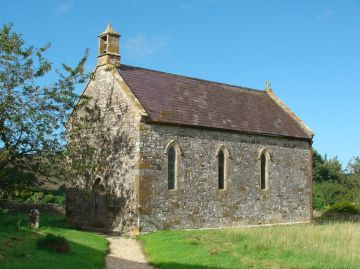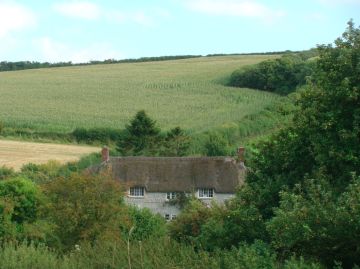
Saint Basil,
Toller Fratrum
© Kim Parker/Dorset OPC 2015
|
Toller Fratrum, often referred to as Little Toller,
is a tiny village and civil parish 8 miles NW of Dorchester situated on a
promontory overlooking the River Hooke just before it meets the River Frome
at Maiden Newton. Anciently the parish included the hamlet of Frogmore (now
part of Toller Porcorum), as well as the chapelry of Wynford Eagle. Farther
'from the Madding Crowd' is hard to imagine: in 1841 the population was 67,
but now it barely reaches double figures.
'Toller' may be derived from 'tol', a pre-Roman word for spring. Some scholars
claim 'toller' is Celtic for 'hollow stream', while others say it is Saxon for
'river with deep gravelly pools'. What is indisputable is that it was a proper
name: the original name of the River Hooke. 'Fratrum' is more easily explained,
being Latin for 'of the brothers'. In 1066 'Tolre' was held by one Alward,
but by 1086 it was in the hands of Oger, with Waleran the ultimate owner.
Then it was gifted to Forde Abbey in Thorncombe and by the end of the 12th
century was in the possession of the Knights Hospitallers of St John of
Jerusalem – they of the black tunics with an eight-pointed white star on
the breast. These warrior knights or 'brothers' owned Toller Fratrum up until
the Dissolution of the Monasteries (1536-41).
|
|
One of the more obvious legacies of the Knights Hospitallers
is the name of the Church. Only two other churches in England are dedicated to
Saint Basil, a 4th-century Eastern cleric who oversaw 50 bishoprics and became
the patron saint of hospitals. It is a single-cell church which despite its
rustic appearance was almost completely rebuilt in Victorian times. In the
medieval era the church may have been larger: one early description says it
had two bells in the tower and a tomb in the Chancel (of Barnard Samways of
Wynford).
There is an unusual Saxon or Norman font decorated with primitive carvings,
the significance of which is now lost. It depicts humans, many with upraised
arms, and beasts, including a dual-bodied / single-headed monster. One theory
is that the carvings narrate a passage in the Book of Revelation where the
Lion of Judah helps the human race and another that it recounts episodes
from the life of Moses, while others see a story of Christ and St Michael.
Also of note is the fragment of a stone relief depicting Mary Magdalene
washing Christ's feet, dating from c1130.
The barn of Little Toller Farm, with its carving of a man eating a loaf,
may have been the knights' refectory. John Samways of Martinstown bought
the estate in 1540 and began to remodel it. Most sources credit him with
building the splendid farmhouse, although a display in St Basil's says it
was rebuilt by Thomas Samways in 1574. Royalist Sir Francis Fulford, whose
father had married Elizabeth, a granddaughter of John Samways (by his second
son Barnard and Grace Long), later added the West wing. Striking features
include elaborate chimneys between which sits a stone monkey admiring himself
in a mirror – a cheeky reminder that all in this life is vanity. |

Toller Fratrum Cottage
©
Kim Parker/Dorset OPC 2015
|
The post of Online Parish Clerk (OPC) is currently vacant
If you would like to volunteer for the role, please contact the OPC Project Co-ordinator
Contributions of additional resource materials for the site are always welcome
|
| Census |
1841 Census [Ann Atkinson]
1851 Census [Ann Atkinson]
1861 Census [Ann Atkinson]
1871 Census [Ann Atkinson]
1881 Census [Ann Atkinson]
1891 Census [Ann Atkinson]
1901 Census [Ann Atkinson] |
| Parish Registers |
Baptisms
Marriages 1616-1836 [Tony
Higgins]
Burials |
| Trade & Postal Directories |
|
| Other Records |
|
| Photographs |
|
| Monumental Inscriptions |
St Basil's Monumental Inscriptions index
[Jan Hibberd] |
| Maps |
|
Records held at the Dorset History Centre
|
Registers
Christenings 1561-1812. Marriages 1561-1757, 1781-2,
1787-1802, 1814-36, 1843-1949. Burials
1558-1812 |



